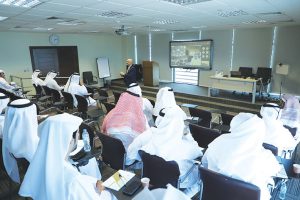ABU DHABI / WAM
The Abu Dhabi Judicial Academy (ADJA) has conducted three training courses of a continuous programme for members of the Public Prosecution during the first half of 2023.
The three courses consisted of 81 training hours within the framework of the strategic training plan to raise technical, administrative, specialised and leadership skills, capabilities and competencies, as well as other secondary judicial sciences such as artificial intelligence, digital medicine and mental health, and training in international best practices and upgrading knowledge of relevant international conventions and treaties.
Counsellor Ali Mohammed Abdullah Al Balushi, Attorney-General of the Emirate of Abu Dhabi, said that the programme for prosecutors continues to hone their capabilities and provides them with integrated skills, according to the approved annual plan of training, which contributes to the development of judicial work, aligning with the vision of His Highness Sheikh Mansour bin Zayed Al Nahyan, Vice President, Deputy Prime Minister, Minister of the Presidential Court, and Chairman of the Abu Dhabi Judicial Department, to enhance knowledge and develop capabilities and ensure creativity and innovation in the judicial system, leading to the application of international best practices.
The Attorney-General explained that the programme is important as it touches on the realistic needs for training by focusing on the practical side of the new laws and legislation and global developments in various areas, which require prosecution methods to deal with them effectively to accomplish security and community stability.
The Academy stated that the programme trains prosecutors on drafting closing orders and appeal notes, enhances investigative skills and deals with crimes against persons and public money (embezzlement and intentional harm), and practical problems relating to indecent assault crimes, patterns of money laundering crimes, judicial inspection on the Public Prosecution work and international humanitarian law.
The Academy indicated that the programme uses a clear methodology for measuring the impact of the training by several assessment methods, including continuous evaluation and assignments for managing complicated cases, self-readings, tests and other methodologies compatible with the best international judicial training practices, which enhance the status of the Academy as a regional and international centre for judicial and legal training.
 The Gulf Time Newspaper One of the finest business newspapers in the UAE brought to you by our professional writers and editors.
The Gulf Time Newspaper One of the finest business newspapers in the UAE brought to you by our professional writers and editors.
